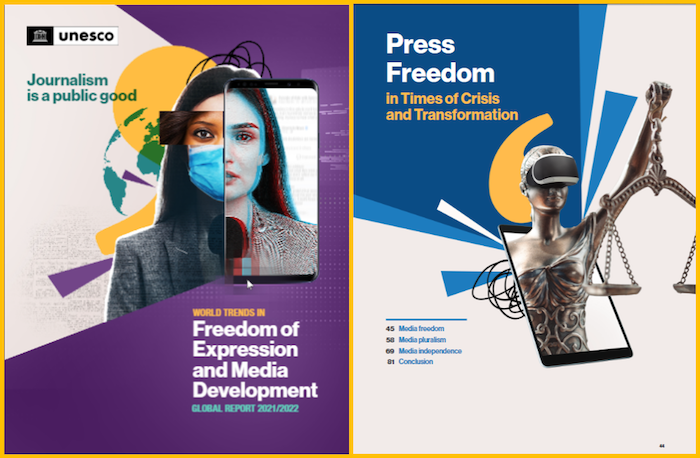UNESCO’s latest report on journalism and media matters, titled ‘Journalism is a Public Good: World Trends in Freedom of Expression and Media Development: Global Report 2021/2022, reports on media freedom, independence, the safety of journalists and related matters.
According to the report, “Independent journalism – the kind that favours public interest over political, commercial, or factional agendas, is in peril. The rapid erosion of the business models underpinning media sustainability has deepened a crisis in the freedom and safety of journalists around the world.”
In fact, over the past five years, “85% of the world’s population experienced a decline in press freedom in their country” and the downward trend across the globe continues, with new laws and policies being adopted around the world that restrict the freedom of expression online. “Dozens of laws have been adopted or amended since 2016 that contain overly vague language or disproportionate punishments … Additionally, in the last five years, government requests for content removal on major internet platforms have doubled.”

“Even in countries with long traditions of safeguarding free and independent journalism, financial and technological transformations have forced news outlets, especially those serving local communities, to close. With readership and advertising markets moving online, advertising revenue for newspapers plummeted by nearly half in the ten-year period ending in 2019.” This, as revenue follows audiences online and social media and other digital platforms continue to grow their number of users and their advertising revenue, and “global newspaper advertising revenue dropped by half in the last five years”.
In addition, “A deluge of mis- and disinformation has contributed to years of declining trust in media worldwide”, as “trust in media and information sources has continued to decline over the past five years”.

A major concern is the danger associated with being a journalist. According to UNESCO, “Journalism remains a deadly profession – in nine times out of ten, the murder of a journalist is unresolved. From 2016 to the end of 2021, UNESCO recorded 455 journalists killed for their work or while on the job.” The latest data from Reporters without Borders/Reporters sans Frontiers (RSF) shows that 24 journalists have already been killed in 2022, 7 of them in Ukraine, with another 11 assaulted, injured or disappeared.

Related to this subject, this week a UK court approved the extradition of Julian Assange to the USA. In response to “the alarming next step in the more than decade-long case”, RSF has started an online petition “to urge UK Home Secretary Priti Patel to reject Julian Assange’s extradition”. RSF says, “the UK government has also failed to protect journalism and press freedom in its treatment of Assange, keeping him detained on remand for more than three years at London’s high-security Belmarsh prison … If extradited to the United States, Assange could face up to 175 years in prison on 18 charges related to Wikileaks’ publication in 2010 of hundreds of thousands of leaked classified military and diplomatic documents, exposing war crimes and human rights violations and informing extensive public interest reporting around the world. RSF fully believes that Assange has been targeted for this important contribution to journalism.”

Juliet Gillies is a highly skilled writer, editor and English specialist. She is a skilled, experienced writer, having started in the marketing/communication field, but now focuses on educational materials and articles on Digital / Social Media / Marketing matters. She has been writing and editing at a professional level for more than 30+ years.
(Sources: UNESCO (https://www.unesco.org/reports/world-media-trends/2021/en) and RSF (https://rsf.org/en/free-assange-petition-april-2022; https://rsf.org/en/news/war-ukraine-list-journalists-who-are-victims-gets-longer-day; https://rsf.org/en/news/uk-rsf-launches-new-freeassange-petition-home-secretary-considers-extradition-order; https://rsf.org/en.)
Ends














